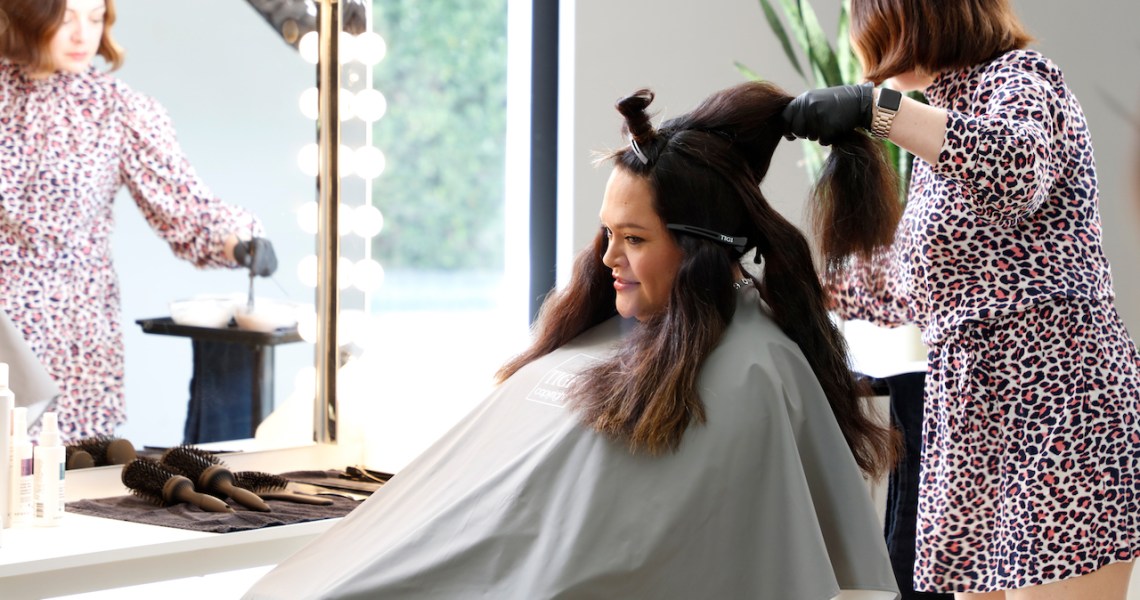Omnichannel may be a current buzz word in beauty retail, but professional hair-care brand Tigi, which was acquired by Unilever in 2009, is trying to emphasize its salon roots.
Founded by stylist Anthony Mascolo, Tigi launched its namesake products in 1982; its Bedhead sub-brand debuted in 1996. But because those lines sell in salons, to stylists, as well as in consumer-facing channels like Amazon and Ulta, Tigi felt the need to slowly roll out a third brand strictly for professionals in the second half of 2018. Dubbed Copyright, the line emphasizes customizable hair treatment, color and styling products, and is sold only in salon environments.
“Tigi was always supposed to be a professional brand, but because of the diversion or challenge in the market in that we saw our products outside of salons, we had to go back to our hairdresser base,” said Elisa Fischer, Tigi general manager.
Since Tigi Copyright’s launch, Fischer said the brand has had to strategically ensure the line remains only in stylists’ hands and not in the same consumer retail channels as Bedhead. For instance, while Tigi Copyright is sold through Kansas, City, Missouri,-based retailer Beauty Brands stores, it does not sell on its online site to ensure products don’t get resold via distributors or stylists. In fact, Tigi Copyright is not available anywhere via e-commerce. Today, Tigi Copyright is sold in 8,639 salons and accounts for 60% of Tigi’s total professional sales volume, which is double-digit millions in sales, said Fischer.
“Retail is the most profitable part of salons, but it is also the most challenging because stylists are not only competing with e-commerce in general, but they are also competing with the fact that so many of the brands they sell are available everywhere,” said Fischer. “Places like Amazon have a big promotional business, which can affect your business. Most stylists don’t care about the place that it is sold; it’s about the price of products.”
Hair salons represented a $46 billion business in 2018, according to the market research group Ibis World, and product sales made up 9.5% of that revenue. Per Kline & Company, Tigi had approximately 3% share of the salon hair-care market in the U.S. in 2018, with sales of approximately $100 million. It saw low-single-digit growth over the course of 2018.
That products are such an impactful portion of sales makes this channel obstacle an issue many hair brands have to reckon with. Companies that have a dual salon and consumer presence are Devacurl (sold in Sephora), Virtue Labs (sold on Amazon via Luxury Beauty, Sephora, Nordstrom and Bluemercury) and Moroccanoil (sold at Sephora and Amazon). All of the aforementioned brands have toed the line in satisfying its salon and stylist partners, with Moroccanoil opening a New York City academy this month. The school includes business classes on how to soft-sell and up-sell products to clients.
While growing distribution remains top of mind, Fischer is presently focused on creating awareness for the Tigi Copyright brand among customers. Its January campaign, “You Can Always Start Over,” featuring celebrity hairstylist and new brand ambassador Andrew Fitzsimons, is meant to be a call to action for consumers to ask for products from their own stylists.
“Andrew was trained with Tigi, and he has that celebrity, influencer and consumer tie-in that gets people talking,” said Fischer, who explained that the company spent a third of its marketing budget to support the campaign via digital, paid social ads and partnerships with other stylists like Wes Palmer, Richy Kandasamy and Jen Planck.
“Our biggest opportunity is to keep Copyright only for the professional. We lost salons and saw Bedhead decline because we didn’t have something just for the stylist. We can’t let ourselves lose this professional brand equity,” said Fischer.




